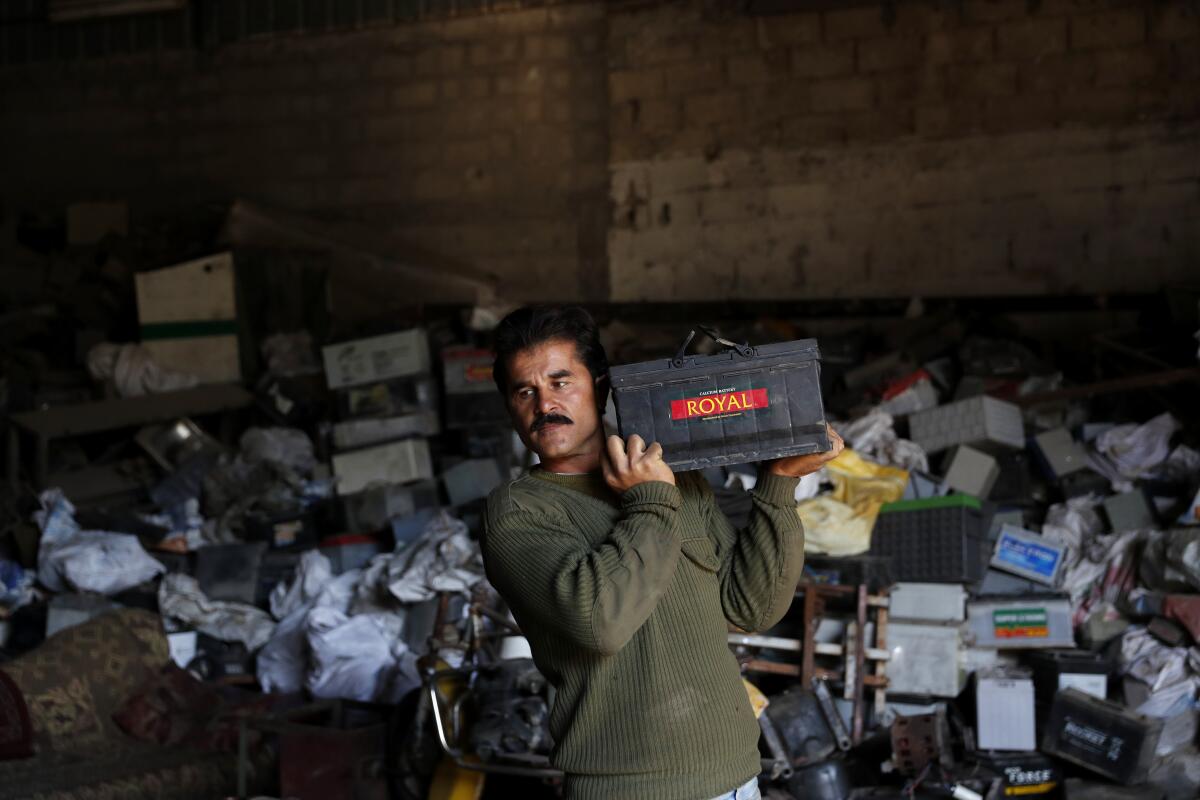Gaza’s old battery pileups pose risk to health, environment

- Share via
GAZA CITY — Virtually every household in the Gaza Strip relies on batteries to keep their home running — a result of years of chronic power outages.
These batteries, fueling everything from lights to internet routers to solar panels, have helped mitigate one crisis. But they are causing another one as huge mounds of old and used batteries pile up in a territory lacking the ability to safely dispose of them.
“There is a real danger that these batteries are collected and stored randomly in the open air; not in warehouses,” said Mohammed Musleh, an official with Gaza’s Environment Authority.
The most pressing threat, he said, is that “the batteries break and ooze liquid that includes sulfuric acid and leaks into the soil and then the water aquifer.”
Gaza’s Environment Authority estimates that there are 25,000 tons of old batteries piled up at several locations across the tiny and overcrowded coastal territory. There are no recycling facilities in Gaza and a punishing blockade imposed by Israel and Egypt prevents shipping the batteries abroad for safe disposal.
According to the U.S. Environmental Protection Agency, used batteries create a number of risks to public health and the environment. Different types of batteries contain potentially dangerous types of metals such as mercury, lead and cadmium, and some can catch fire.
Such risks are especially acute in Gaza, where the healthcare system has been ravaged by years of conflict and lack of funds and where the environment is already in dire condition. Nearly all of Gaza’s water is undrinkable due to high saline levels caused by overextraction.
Israel bombed Gaza’s sole power plant during a round of fighting in 2006 and imposed the blockade with Egypt the following year after the Hamas militant group seized power in the strip from rival Palestinian forces. The result: a daily blackout of at least eight hours, punctuated with longer outages that can last for days during winter storms or conflicts.
This has turned batteries into an integral part of day-to-day life for the territory’s 2 million residents.
The Gaza City municipality has a hazardous waste unit that is meant to safely dispose of old batteries. But Ahmed Abu Abdu, head of the unit, says very few batteries reach him. Instead, a small private industry has sprouted up.
Every day, collectors in cars or donkey-drawn carts roam around Gaza, calling over loudspeakers for people wishing to sell old batteries. Depending on their size, old batteries can fetch up to $2 apiece.
Khaled Ayyad is one of dozens of merchants who buy the old batteries. For eight years, he has collected and stored them at a warehouse in northern Gaza.
Ayyad has one goal in mind: to export the batteries and make a decent profit.
“As the Israeli side allows them [batteries] into Gaza, it has to let them go out,” he said. “We can sell them to factories in Israel, European countries and all over the world.”
But exporting batteries is still banned, and Ayyad is facing a new dilemma: He has about 500 tons of batteries accumulated in the warehouse.
He can’t resell, export or dump them, and he has been paying storage fees. So he has a message to Hamas: “We call on the officials in Gaza to speak to the Egyptian side to let us export them there.”
There is a precedent. Hamas and Egypt have boosted trade cooperation in recent years through a crossing in the border town of Rafah. The crossing is used mainly to deliver goods like construction materials, fuel and tobacco products into Gaza. But it has also been used to ship scrap metal out to Egypt.
While Ayyad’s warehouse has a concrete floor, most other storage locations are outdoors, risking spills of hazardous materials straight into the soil.
There have been no studies conducted on the threat to the environment, but research carried out in 2013 by a Gaza neurologist and an environmental science expert warned that children of people dealing with discarded batteries have “different degrees” of poisoning from exposure to lead.
Trying to reduce the danger, Hamas authorities have banned the import of secondhand batteries since 2017.
The Gaza-based al-Mezan Center for Human Rights, which in 2018 issued a report warning of the threat of batteries, said the danger is “far-reaching.”
“There is a problem,” said Hussein Hammad of the rights group. “Here, the batteries have started to affect human rights: the right to health, the right to clean environment and the right to life.”
More to Read
Sign up for Essential California
The most important California stories and recommendations in your inbox every morning.
You may occasionally receive promotional content from the Los Angeles Times.










